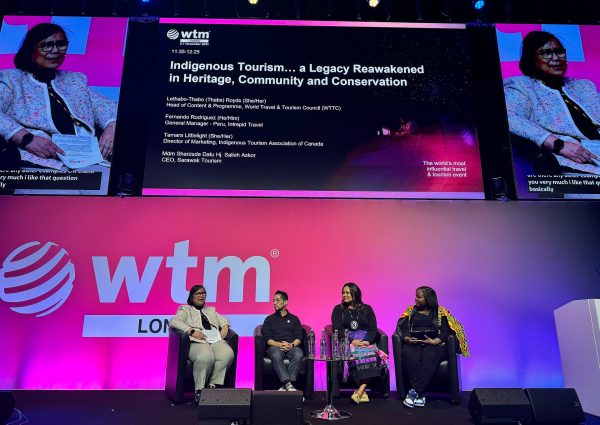SINGAPORE, 14 November 2024: Indigenous Tourism is reshaping the travel landscape in Sarawak, according to Sarawak Tourism Board CEOS Sharzede Datu Hj Salleh Askor.
Sharzede shared how indigenous-led efforts fostered meaningful connections for travellers while honouring cultural legacies, supporting local economies, and conserving vital natural resources during a panel discussion co-hosted with the World Travel and Tourism Council (WTTC) in London earlier this month.

The session, “Indigenous Tourism… A Legacy Reawakened in Heritage, Community, and Conservation,” highlighted the power of Indigenous-driven tourism initiatives to preserve cultural heritage, promote sustainable practices, and drive economic and social impact within local communities.
Sarawak’s Pioneering Role in Indigenous Tourism
Sharzede highlighted how Sarawak Tourism Board’s initiatives place indigenous communities at the core of its tourism strategy. Sarawak’s approach empowers communities to share their heritage and traditions while directly benefiting from tourism activities.
“Indigenous Tourism in Sarawak is a testament to responsible tourism that honours both people and the planet,” Sharzede reflected. “We are proud to create experiences where culture, nature, and sustainability intersect, positively impacting local communities and visitors alike.”
Key Highlights
- Cultural Engagements and Authentic Experiences
- Sarawak offers travellers immersive experiences, from traditional longhouse stays to vibrant celebrations like Gawai Dayak, providing unique insights into Sarawak’s indigenous way of life. Cultural festivals and crafts workshops foster interaction between visitors and locals, deepening their understanding of Sarawak’s rich cultural landscape.
- Economic Empowerment and Sustainability
- Sarawak’s indigenous tourism strategy generates sustainable income for artisans, musicians, and local homestay operators, particularly through events such as the Rainforest World Music Festival. These initiatives showcase the state’s cultural treasures and empower indigenous communities to sustain their livelihoods and preserve their heritage.
- Environmental Stewardship and Conservation Initiatives
- Emphasising environmental responsibility, Sarawak’s tourism model incorporates sustainable practices, including the Forest-to-Table initiative and EcoGreen Planet programme, which involves reforestation efforts. By embracing green innovation, local artisans also produce eco-friendly crafts, preserving traditional artistry while appealing to eco-conscious travellers.
- Empowerment through Digital Tools
- Through the Jejak Digital programme, Sarawak equips local communities with the tools to share their unique stories and tourism offerings with a global audience. This digital empowerment initiative ensures that Indigenous communities can reach wider markets and sustainably promote their cultural heritage.
- Sarawak Responsible Tourism (RT) Pledge
- Sharzede also highlighted Sarawak’s Responsible Tourism Pledge, which encourages visitors to respect and conserve the state’s cultural and natural heritage. This pledge attracts eco-conscious travellers who value sustainable and mindful tourism by fostering mutual respect between locals and visitors.
- Commitment to Sustainable Development Goals (SDGs)
- Sharzede illustrated how Sarawak’s tourism strategy aligns with the UN Sustainable Development Goals (SDGs), prioritising quality education, climate action, and sustainable tourism practices. This commitment underscores Sarawak’s dedication to responsible tourism, drawing travellers who value authenticity, community empowerment, and conservation.
The Lasting Impact of Indigenous Tourism
Sharzede’s insights underscored Sarawak’s commitment to fostering a sustainable tourism model that respects cultural heritage and empowers local communities. By positioning Indigenous Tourism as an essential part of its identity, Sarawak is pioneering a model for responsible tourism that benefits both residents and visitors, strengthening its global reputation as a destination for cultural and environmental stewardship.
For further information, visit: www.sarawaktourism.com







